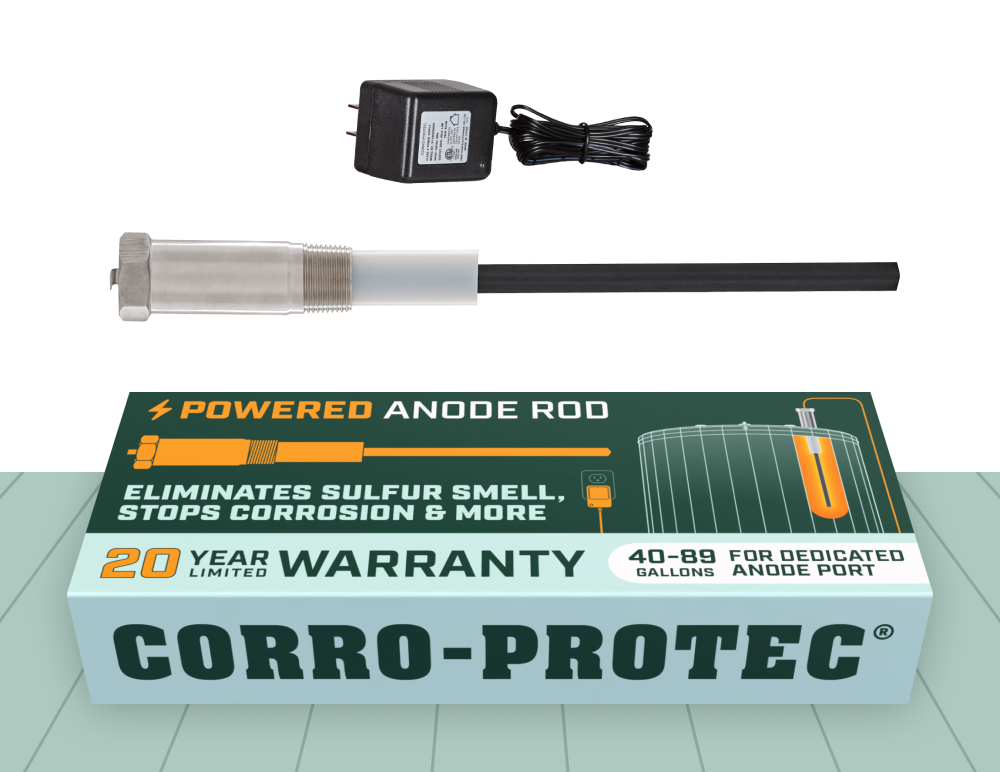Why Does My Well Water Smell Like Rotten Eggs?

Why Does My Well Water Smell Like Rotten Eggs?
Hydrogen sulfide gas is often responsible for giving well water a “rotten egg” smell or taste. This gas can occur in wells anywhere and may result from natural processes, such as the decay of organic matter or chemical reactions with soil and rock.
It can also be produced by sulfur bacteria present in the groundwater, well, or plumbing system.Many well-water users experience this unpleasant odor, which often signals a problem within your well system.
Beyond being an annoyance, sulfur smells can affect the water quality and cause corrosion issues in your plumbing. Hydrogen sulfide can create a highly acidic environment, which, over time, accelerates corrosion on metal surfaces inside your plumbing.
Eliminate that rotten egg smell for good!
Say goodbye to rotten egg smell and extend the life of your water heater with the Corro-Protec anode rod. Find out how this innovative solution can eliminate odors and protect your tank !

Common Causes of Sulfur Smell in Well Water
Understanding why well water smells like rotten eggs or sulfur requires identifying its root causes. Here are the most common reasons:
Hydrogen Sulfide Gas in Groundwater
Hydrogen sulfide gas is a common cause of the rotten egg smell in well water. It can dissolve in groundwater and is often found in areas with high organic matter levels or near geothermal activity.
– Why It Occurs : Hydrogen sulfide naturally forms in low-oxygen environments, such as groundwater and deep wells, where organic matter decays.
– How It Enters the Water Supply : This gas can seep into well water through surrounding soil and bedrock, particularly in regions with high sulfur content.
Bacterial Growth in the Well or Water Treatment System
Anaerobic bacteria that thrive in oxygen-poor environments can produce hydrogen sulfide gas as a byproduct, contributing to the sulfur smell in well water. This situation is common in poorly maintained wells or pipes.
– Anaerobic Bacteria and Sulfur Production : Certain bacteria feed on sulfur compounds in the water, creating the hydrogen sulfide gas responsible for the rotten egg smell.
– Conditions That Promote Bacteria : Low-oxygen, high-sulfur environments foster the growth of anaerobic bacteria, making the rotten egg smell more likely.
Reactions Between Magnesium Anode Rods in Water Heaters and Sulfur
If your well water smells like rotten eggs, primarily when using hot water, the source may be in your water heater.
– Why Magnesium Rods Cause Sulfur Smell in Well Water : Magnesium anode rods, commonly used in water heaters to prevent tank corrosion, react with sulfates in the water, creating hydrogen sulfide gas.
– When to Replace Your Anode Rod : If the rotten egg smell is only present in the hot water, replacing the magnesium rod with a titanium-powered anode rod will effectively resolve the odor issue. An aluminum anode rod may also help, though it is not always as reliable.
How to Detect the Source of Rotten Egg Smell in Well Water
Before treating the smell in well water, it’s essential to identify its source. Here’s how to pinpoint where the rotten egg smell in well water originates.
Determine If the Smell Is Present in Hot or Cold Water
– If Only Hot Water Smells Like Rotten Eggs : This often indicates an issue with the water heater, likely due to the magnesium anode rod. Replacing it with a suitable anode will solve the problem, but be sure not to simply remove it, as this would leave your water heater unprotected against corrosion and could lead to further issues.
– If Both Hot and Cold Water Have a Sulfur Smell : This usually means the well or water treatment system is the source, requiring broader treatment.
Test Water for Hydrogen Sulfide, Sulfur, and Bacteria
To diagnose the rotten egg smell in your well water, start with a thorough water test. Testing can reveal the concentration of hydrogen sulfide, sulfur, and sulfur-producing bacteria.
– At-Home Water Testing Kits : These kits are available to detect hydrogen sulfide gas and bacteria in well water. High levels of hydrogen sulfide indicate the need for treatment.
– Professional Testing for More Accuracy : For precise results, consult a water testing professional who can accurately measure sulfur levels and bacteria types.
Solutions for Removing Sulfur Smell from Well Water
How to Perform Shock Chlorination :
1. Turn off the well pump and remove the well cap.
2. Pour chlorine bleach directly into the well.
3. Run the water through the faucets until you smell chlorine in each, then turn it off.
4. Allow the water to sit for 12-24 hours, then flush until the chlorine smell is gone.
Frequency : Shock chlorination should be repeated every six months to a year, depending on the sulfur levels and water quality.
Install an Activated Carbon Filter
Activated carbon filters are a chemical-free solution to remove sulfur from well water and effectively eliminate hydrogen sulfide gas.
– How Carbon Filters Work : Activated carbon absorbs hydrogen sulfide and other contaminants, neutralizing the rotten egg smell.
– Choosing the Right Filter : Choose a filter designed for hydrogen sulfide removal. Regularly replace it to maintain its effectiveness.
Aeration Systems for Sulfur Gas Ventilation
Aeration systems allow sulfur gas to vent from water before it reaches your faucets, reducing the smell in well water.
– How Aeration Systems Work : These systems mix water with air, releasing hydrogen sulfide gas before it flows into the home.
– Installation and Maintenance : Although effective, aeration systems require ample space and periodic upkeep to ensure they function efficiently.
Preventing Rotten Egg Smells in Well Water
Maintaining water quality in a well requires regular attention and proactive measures to prevent sulfur smells. Here’s how to keep your well water odor-free in the long term.
Routine Well Maintenance and Testing
Test your water at least once a year for hydrogen sulfide, bacteria, and pH levels. Frequent checks help catch issues early. Inspect the well cap, seal any potential contaminants, and consider flushing the well occasionally to remove sediment buildup.
Testing Frequency : Test your water at least once a year to check for hydrogen sulfide, bacteria, and pH levels. Regular testing helps identify issues early.
Basic Maintenance Tips : Inspect the well cap, seal off any potential contaminants, and consider occasionally flushing the well to remove sediment buildup.
Professional Water Treatment Solutions
Consult a water treatment specialist if you experience persistent sulfur odors in your well water. They can recommend tailored systems suited to your specific needs, such as sulfur filters or hydrogen sulfide removal equipment.
Keeping Your Water Heater Clean and Anode Rod Inspected
To prevent the rotten egg smell in well water from impacting your hot water, maintain your water heater and inspect the anode rod regularly.
– Drain the Water Heater Annually : This removes sediment and reduces the risk of hydrogen sulfide production.
– Replace Anode Rods When Necessary : Inspect your anode rod and replace it every few years to prevent it from reacting with sulfur and install a powered anode rod that is more durable (20 years) than anode made of magnesium or aluminum/zinc (few years only).
FAQs about Sulfur Smells in Well Water
The rotten egg smell in well water is usually due to hydrogen sulfide gas, caused by either sulfur bacteria in the well or a chemical reaction with a magnesium anode rod in your water heater.
Solutions include shock chlorination, using activated carbon filters, installing a powered anode rod, and aeration systems. Each method targets specific causes of the sulfur smell in well water.
Sulfur in well water is generally safe in small amounts but can affect taste and smell. Higher concentrations should be treated, as they can lead to pipe corrosion and other issues.
Heavy rain can introduce new organic material or sulfur into groundwater, temporarily increasing hydrogen sulfide levels and causing sulfur smells in well water.
Test
Why Does My Water Smell Like Rotten Eggs and How to Get Rid of It
The rotten egg smell in water is usually caused by hydrogen sulfide gas. This colorless gas has a distinct, sulfur-like odor. It is commonly found […]
Effective Strategies to Remove Sulfur Smell from Your Hot Water Heater
Many homeowners face the unpleasant sulfur smell in hot water. This odor, often resembling rotten eggs, can make using hot water for daily tasks unpleasant. […]

